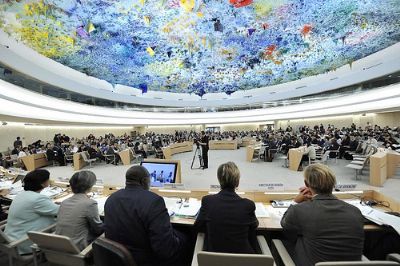Coinciding with Ramadan, the United Nation's top human rights body - the Human Rights Council - has been celebrating its tenth anniversary in Geneva starting on Monday. Council members like human rights stalwarts Saudi Arabia, Qatar, and the United Arab Emirates, along with President Obama's delegation, will be singing the Council's praises - accompanied by a mandatory cacophony of rumbling bellies.
Here are four reasons that UN bosses & their government cohorts are celebrating - and human rights advocates and victims are not.
1. The Council is ground zero for rationalizing religious domination. To wit: At this session of the Human Rights Council, lunch has been cancelled for everyone. It's Ramadan. If Muslims can't eat, says the UN, neither can anybody else. Back in April, the Council's executive ("the Bureau") took the decision to ban lunch hour, behind closed doors, and the policy goes into effect on Monday. The decision reads:
" ... the Bureau took note of the efforts to address the concern raised by the OIC [Organization of Islamic Cooperation] Coordinator and members that the session collides with Ramadan. In order to facilitate the participation in the session of delegates who would be observing the fast during the month of Ramadan, the Bureau decided that on most days the working hours during the session would start from 10 am at the earliest and last until 6 pm at the latest, without breaks."
2. Actually protecting human rights is not a condition for membership on the Council. Members are elected annually by the General Assembly. The resolution governing the procedure says that when casting ballots, countries "shall take into account the contribution of candidates to the promotion and protection of human rights and their voluntary pledges and commitments made thereto."
The most recent elections to the Human Rights Council, which took place in the fall of 2015, illustrate how UN verbiage works. The sexist, xenophobic dictators who run the United Arab Emirates pledged: "The UAE has built a peaceful, tolerant, multicultural society in which people from all over the world live harmoniously together." Human rights basket case Burundi didn't even bother to make a pledge.
Both were elected. This year, a mere 38% of the Council's members are free democracies.
3. The Council has a Jewish problem. One-third of all its resolutions and decisions critical of a country for violating human rights are directed at just one state - democratic Israel. That's three times as many condemnations of Israel as its nearest competitor - hellish Syria' 10 times more than the Al Qaeda vacation spot of Libya and thirteen times more than the execution-per-capita capital of the world, Iran.
As for the millions of women experiencing modern slavery in Ramadan-compliant Saudi Arabia, the millions in Crimea "freed" by Russian tanks, and the billions in China who've never known civil liberties: zip.
4. The biggest and most important fan of the Council is none other than the United States. The Bush administration refused to join or to pay for the Council on the grounds that a human rights body where decision-makers don't respect human rights might not be in sync with American values. But the first major foreign policy decision in 2009 of President Obama and Secretary of State Hillary Clinton was to jump on the UN bandwagon and throw taxpayer money at it.
Ever since, the administration's storyline is that the close affiliation of the world's leading democracy to the Council doesn't legitimize discrimination against Israel and antisemitism, or empower faux human rights experts. The current U.S. ambassador to the Human Rights Council, Keith Harper, advised Congressmen at a hearing on Capitol Hill as recently as May 17, 2016 not to worry about the entrenched anti-Israel agenda because the built-in bias "will be reviewed in 2021."
Maybe Council members believe the sounds of empty diplomat paunches will drown out the cries of the victims of intolerance in Tel Aviv and Orlando, Brussels and San Bernardino. They're wrong.
June 13, 2016
UN-happy anniversary to the Human Rights Council: The anti-Israel body makes a mockery of its responsibilities

UN Human Rights Council, Geneva
Date
June 13, 2016
Title
UN-happy anniversary to the Human Rights Council: The anti-Israel body makes a mockery of its responsibilities, NY Daily News
Author(s)
Anne Bayefsky
Original Source
